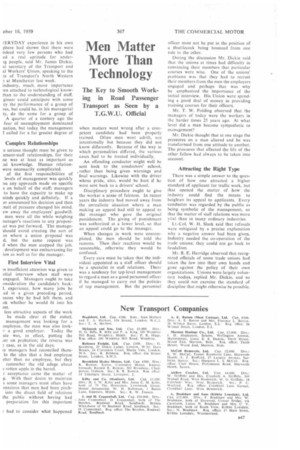Men Matter More Than Technology
Page 81

If you've noticed an error in this article please click here to report it so we can fix it.
TERYDAY experience in his own phere had shown that there were ndeed very few persons who had ed a real aptitude for under1g people, said Mr. lames Dickie, al secretary of the Transport and al Workers' Union, speaking to the te of Transport's North Western at Manchester last week, industry, much, more importance !en attached to technological knowthan to the understanding of staff. gineer could anticipate with some cy the performance of a group of nes, but could he, in his managerial ty, do the same for a group of A quarter of a century ago the fear of unemployment dominated uation, but today the management f called for a far greater degree of
Complex Relationships .e serious thought must be given to ement-staff relationships, for their tie was at least as important as :al knowledge. Human relationwere necessarily complicated.
of the first responsibilities of levels of management was quickly :ss any approach made on sRecific s on behalf of the staff; managers to have the capacity to make up ninds quickly and definitely. If a ,er announced his decision and then :sult of pressure changed his mind, ew away the employees' goodwill. men were all the while weighing nanager's reactions to any proposiiat was put forward. The manageshould avoid creating the sort of an where a union proposal was d, but the same request was d when the men stopped the job.
• development was embarrassing for ion as well as for the manager.
First Interview Vital
In insufficient attention was given to titial interview when staff were engaged. Managers ought to take onsideration the candidate's backI, experience, how many jobs he ad in a given preceding period, asons why he had left them, and tsk whether he would fit into his ost.
less attractive aspects of the work be made clear at the outset. management was looking for a employee, the man was also lookr a good employer. Today the ate was, in effect, putting the fer on probation; the reverse was e case, as in the old days.
of managers had reconciled themto the idea that a bad employee etter than no employee, but they remember the old adage about e rotten apple in the barrel.
r acceptance came the matter of g. With their desire to maintain s some managers must often have onscious that men had been pitchinto the direct field of relations the public without having had preparation for this important had to consider what happened
when matters went wrong after a competent candidate had been properly trained_ Often men went adrift, not intentionally but because they did not know differently. Because of the way in which personalities differed, the various cases had to be treated individually.
An offending conductor might well be sent back to the conductors' school, rather than being given warnings and final warnings. Likewise with the driver whose pride, also, would be hurt if he were sent back to a drivers' school.
Disciplinary procedure ought to give the worker a sense of fairness. In recent years the industry had moved away from the unrealistic situation where a man making an appeal had still to appeal to the manager who gave the original punishment. The giving of punishment was authorized at a lower level, so that an appeal could go to the manager.
When changes in work were contemplated, the men should be told the reasons. Then their reactions would be reasonable, otherwise they would be confused.
Every care must be taken that the individual appointed as a staff officer should be a specialist in staff relations. There was a tendency for top-level management to regard a man as a good personnel officer if he managed to carry out the policies of top management. But the personnel officer must not be put in the position of a thuttlecock being bounced from one side to the other.
During the discussion Mr. Dickie said that the unions at times had difficulty in convincing their members that particular courses were wise. One of the unions' problems was that they had to recruit their members from the men the employers engaged and perhaps that was why he emphasized the importance of the initial interview. His Union were spending a good deal of money in providing training courses for their officers.
Mr. T. W. Polding observed that the managers of today were the workers in the harder times 25 years ago. At what level did a man become sympathetic to management?
Mr. Dickie thought that at one stage the pressures on a man altered and he was transformed from one attitude to another. The pressures that affected the life of the other fellow had always to be taken into account.
Attracting the Right Type
There was a simple answer to the question of how one attracted a higher standard of applicant for traffic work, but that opened the matter of how the industry could find the means to heighten its appeal to applicants. Every conductor was regarded by the public as being symbolic of the management, so that the matter of staff relations was more vital than in many ordinary industries.
Lt.-Col. W. H. Slack said that refusals were mitigated by a precise explanation why a negative answer had been given. Industry needed the co-operation of the trade unions; they could not go back to feudalism.
Mr. R. E. Herridge observed that recognized officials of some trade unions had taken the law into their own hands and gone against the policy of their own organizations. Unions were largely voluntary bodies, replied Mr. Dickie, and so they could not exercise the standard of discipline that might otherwise be possible.




















































































































